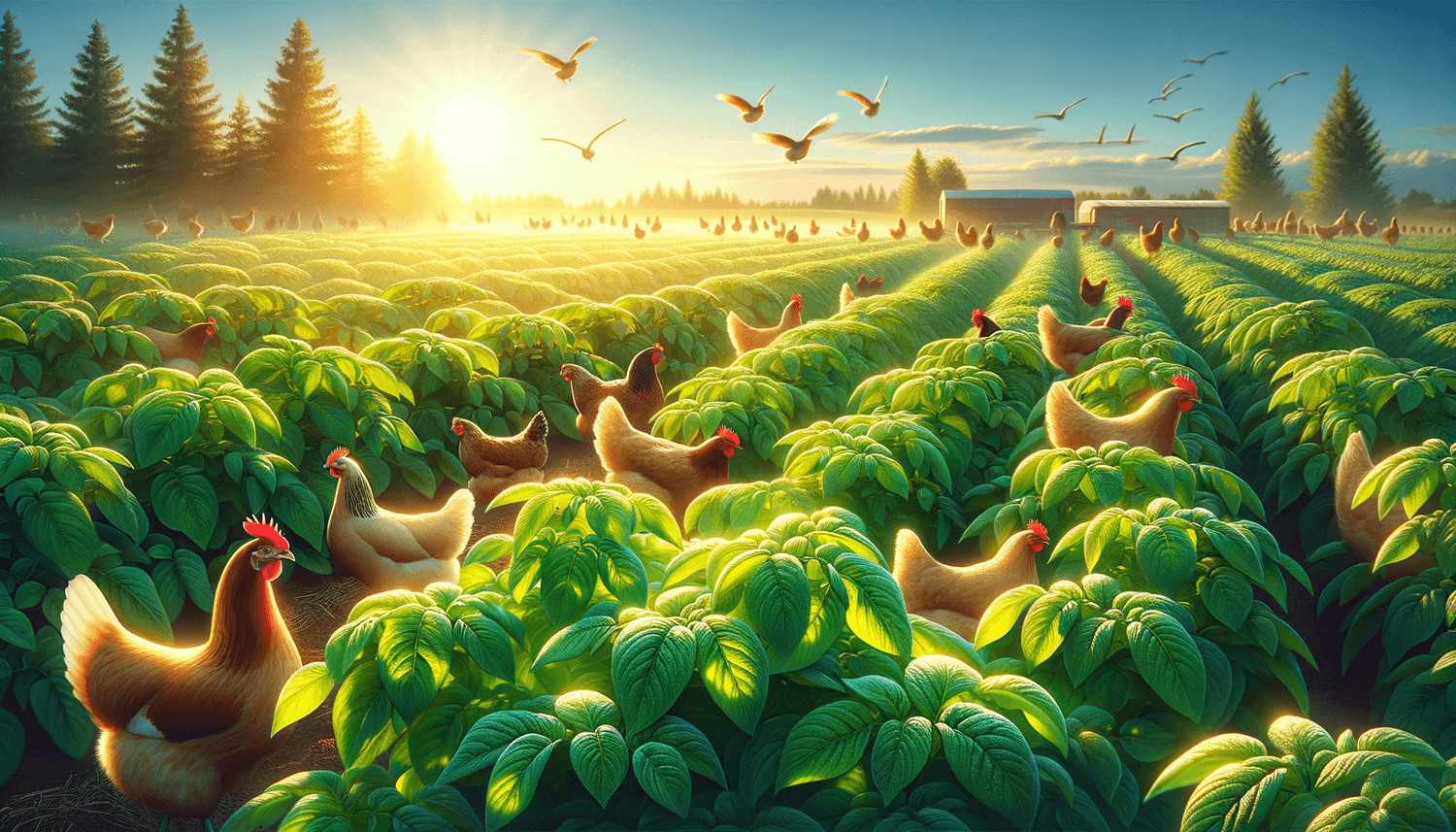Have you ever wandered outside to your lovely backyard chickens, basket of fresh potatoes in hand, and wondered, “Can my feathery friends feast on these fantastic foliage?” Well, ponder no more, dear reader! Today’s blog post is here to answer that tantalizing tuber-ific question, as well as diving into the importance of a balanced diet, juicy benefits and potential risks, the nutritional nitty-gritty, and even some peck-worthy preparation tips for your pretty little peeps.
Can chickens eat potato plants?
No, chickens should not eat potato plants. Potato plants, especially the leaves and stems, contain a toxic compound called solanine, which can be harmful or even fatal to your chickens. Therefore, it is not safe to feed your feathered friends any part of a potato plant.
A balanced diet for happy hens
Just like humans, chickens need a balanced diet to maintain optimal health and happiness. Ensuring that your hens have access to the right nutrients will not only benefit their well-being, but it will also help them produce tastier eggs for you to enjoy. It’s a win-win situation!
A chicken’s diet should primarily consist of a high-quality chicken feed, which should make up around 80-90% of their diet. This chicken feed will provide the essential protein, vitamins, and minerals they need for healthy growth and development. Plus, it has been specifically formulated to meet their unique dietary needs and help them lay the best eggs possible.
The remaining 10-20% of their diet can consist of tasty treats like fruits and vegetables. These delicious, natural goodies not only add variety to your chicken’s meals, but also provide a fun and exciting source of entertainment and bonding for your feathered family members. Just remember to maintain moderation and stick to treats that are safe for your chickens to enjoy.
Nutritional value of potato plants for chickens.
As mentioned earlier, chickens should not eat potato plants due to the presence of a toxic compound called solanine. This compound, found in the leaves, stems, and even in green potatoes, is harmful and can potentially be fatal to chickens. Consequently, potato plants do not offer any nutritional benefits for chickens as they cannot safely consume the plant.
Though potato plants are off the menu, it is essential to find alternative sources of nutrition to provide your chickens with the vitamins, minerals, and other nutrients they need for optimal health. Fortunately, there is an abundance of safe, healthy, and tasty treats available for your backyard flock. By focusing on these more suitable options, you can ensure your chickens receive appropriate nourishment and avoid the risks associated with feeding them potato plants.
Nutrition table of potato plants for chickens.
| Information | Description |
|---|---|
| Nutritional Value | None, as potato plants are toxic to chickens and should not be fed. |
| Suggested Serving Size | No safe serving size, as potato plants are toxic to chickens. |
| Safe Feeding Practices | Do not feed potato plants to chickens; they are dangerous and potentially lethal. |
| Preparation | Not applicable due to the toxic nature of potato plants for chickens. |
| Potential Risks | Toxicity from solanine, possibly leading to illness or death in chickens. |
| Hydration | Not applicable as chickens should not consume potato plants. |
| Digestion | Not applicable as chickens should not consume potato plants. |
| Seasonal Availability | Not applicable as chickens should not consume potato plants. |
| Other Benefits | No benefits, as potato plants are toxic to chickens and should not be fed. |
Safe treats and snacks for your chickens
Now that we’ve established that potato plants are an absolute no-go for our feathered friends, you might be wondering what other treats can safely fill the void. Many fruits and vegetables can be fed to chickens without any concerns, offering a diverse and nutritious buffet to liven up their daily menu.
Some of the most popular safe options for chickens include leafy greens like lettuce, spinach, and kale, alongside other veggies like carrots, cucumbers, and pumpkins. Chickens also enjoy fruits like apples, strawberries, and watermelon. When feeding chickens fruits, ensure that you remove any seeds, particularly in the case of apples, as they contain a small amount of cyanide which could be harmful to your chickens.
Protein-rich snacks for healthy hens
In addition to fruits and vegetables, chickens can benefit from occasional protein-rich snacks as well. Feeding them cooked eggs, mealworms, or other insect-based treats can provide an extra boost of protein and help support their overall health. Remember to provide these protein-rich snacks in moderation to maintain a well-balanced diet.
Creating an engaging and nutritious environment
Introducing safe and nutritious snacks to your chickens’ daily routine isn’t just about keeping their tummies full; it can also enhance their overall well-being. Providing different textures, colors, and shapes of foods will encourage natural foraging behavior and add a bit of excitement to their environment. Try hanging fruits and vegetables to create a fun and stimulating “pecking” experience for your flock.
Ultimately, by understanding which plants and foods are safe and beneficial for your chickens, you can create a thriving and happy environment for your backyard companions. Focus on providing a balanced diet that supports their nutritional needs and offers variety, while always steering clear from risky choices like potato plants to ensure a safe and healthy flock.

















